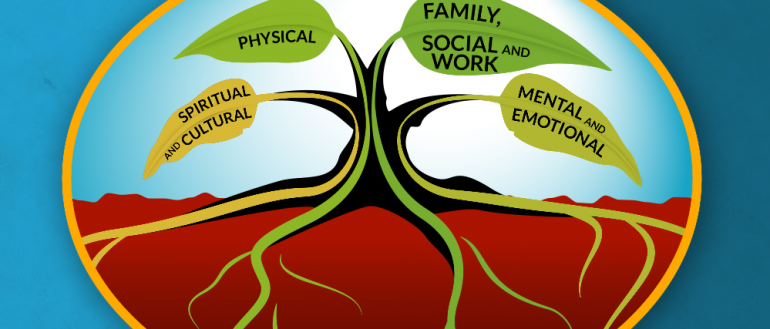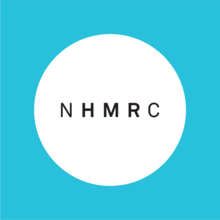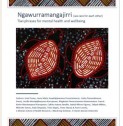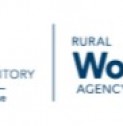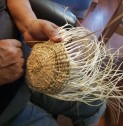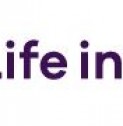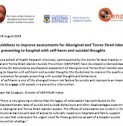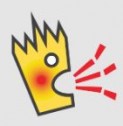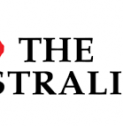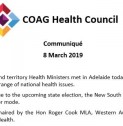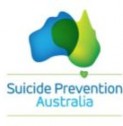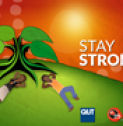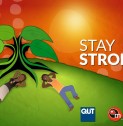Mental illness and wellbeing concerns are among the fastest growing health problems nationwide. Menzies addresses these challenges by empowering Aboriginal and Torres Strait Islander people through strengths-based research approaches.
Menzies’ projects focus on identifying problems early, and then developing tools to help communities and individuals to stay strong – socially, spiritually, emotionally and mentally.
Mental illnesses are among the fastest growing health problems nationwide and Indigenous Australians are at high risk.
Menzies researchers are seeking to prevent mental illness by identifying the tools and methods people and communities need to stay socially, spiritually, emotionally and mentally strong.
Our research focus:
- To communicate 'two-way' mental health messages and to discover ways to overcome language and literacy barriers.
- To address mental health literacy needs in remote and urban settings for primary care and specialist services.
- To develop the skills of Indigenous researchers and to conduct research that provides practical and culturally appropriate early intervention and treatment.
Our research impact:
- Our program of research – the Aboriginal and Islander Mental health initiative (AIMhi) – has given Indigenous service providers and communities a range of tools to better recognise and manage the problems causing mental illness, such as social issues, work worries and family stress.
- The AIMhi Stay Strong Plan and other AIMhi resources have been developed and continue to be used in a diverse range of services across the country. The AIMhi resources promote integrated care and are used in mental health, substance use, youth, primary care, perinatal and chronic disease services.
- Our AIMhi Stay Strong App is one of very few e-mental health resources designed to meet the needs of Indigenous Australians and is supported by the Australian Government’s e-Mental Health Strategy.
- Many health professionals, community workers and service providers have been trained in different settings to use the AIMhi approach through the training programs and materials that we have developed.
- AIMhi has explored and supported new approaches to care for people with alcohol related injuries in hospital.
- AIMhi has collaborated with the ABCD partnership and One21seventy to develop primary care tools and training that support best practice in early intervention in mental health and youth health.
Key staff:
- Tricia Nagel
- Stefanie Puszka
- Michelle McGuirk
- Josie Povey
- Christabel Lewis
- Kylie Dingwall
- Michelle Sweet
Current projects
- Aboriginal and Islander Mental Health Initiative for Youth (AIMhi-Y)
- Aboriginal and Islander Mental Health Initative for Youth (AIMhi-Y) Feasibility study
- AIMhi NT
- the AIMhi Stay Strong app
- e-Mental Health in Practice (eMHPrac)
Completed projects
- Strengthening the Wellbeing Workforce for a Healthier Future: An Evaluation of a Mental Health BuildSkills Initiative in the Northern Territory
- Ngawurramangajirri - Tiwi Mental Health Literacy Project
- Information, Linkages and Capacity Building (ILC) Iron Triangle Community Engagement Project
- Wellbeing Intervention for Chronic Kidney Disease (WICKD)
- Best practice in early intervention, assessment and treatment of depression and substance misuse (BEAT)
- The development of culturally-appropriate cognitive assessments with applications in substance abuse and mental health with Indigenous clients
- Weathering Well app
- Puszka, S., Dingwall, K., Sweet, M., Nagel, T. (2016) E-Mental Health Innovations for Aboriginal and Torres Strait Islander Australians: A Qualitative Study of Implementation Needs in Health Services, JMIR Mental Health, 3(3): e43
- Povey, J., Mills, P.P., Dingwall, K.M., Lowell, A., Singer, J., Rotumah, D., et al. (2016). Acceptability of Mental Health Apps for Aboriginal and Torres Strait Islander Australians: A Qualitative Study. Journal of Medical Internet Research, 18(3), e65.
- Dingwall, K., Puszka, S., Sweet, M., Mills, P.P. & Nagel, T. (2015). Evaluation of a culturally adapted training course in Indigenous e-mental health. Australasian Psychiatry, 23(6), 630-635.
- Dingwall, K.M., Puszka, S., Sweet, M., & Nagel, T. (2015). “Like drawing into sand”: Acceptability, feasibility and appropriateness of a new e-mental health resource for service providers working with Aboriginal and Torres Strait Islander people. Australian Psychologist, 50, 60-9.
- Puszka, S., Nagel, T., Matthews, V., Mosca, D., Piovesan, R., Nori, A., & Bailie, R. (2015) Monitoring and assessing the quality of care for youth: developing an audit tool using an expert consensus approach. International Journal of Mental Health Systems, 9(28)
- Prowse, P., & Nagel, T. (2014). Developing an instrument for assessing fidelity of motivational care planning: The Aboriginal and Islander Mental health initiative adherence scale. International Journal of Mental Health Systems, 8, 36.
- Schierhout, G., Nagel, T., Si, D., Connors, C., Brown, A., & Bailie, R. (2013). “Do competing demands of physical illness in type 2 diabetes influence depression screening, documentation and management in primary care: a cross-sectional analytic study in Aboriginal and Torres Strait Islander primary health care settings.” International Journal of Mental Health Systems 7(1), 16.
- Nagel, T., & Thompson, C. (2010). The central role of Aboriginal families in motivational counseling: family support and family ‘humbug’. Australian Indigenous HealthBulletin, 10(1).
- Liliberte, A., & Nagel, T. (2010). LI-CBT with Indigenous consumers: creative solutions for culturally appropriate mental health care In: Oxford Guide to Low Intensity CBT Interventions. In Bennett-Levy, et al .Oxford Guide to Low Intensity CBT Interventions. Oxford Guides in Cognitive Behavioural Therapy . Oxford University Press, Oxford, UK, 577-585.
- Nagel, T., Thompson, C., Spencer, N., Judd, J., & Williams, R. (2009). Two way approaches to Indigenous mental health training: Brief training in brief interventions. Australian e-Journal for the Advancement of Mental Health (AeJAMH), 8(2).
Click here to view more mental health publications in PubMed.
- Digital Stay Strong plan
- AIMhi pictorial care plan
- AIMhi Stay Strong iPad App
- AIMhi Stay Strong Android App
- AIMhi Stay Strong Planning | Brief Treatment Manual
- AIMhi anxiety
- AIMhi Alcohol & Other Drugs Brief Assessment
- Brief Wellbeing Screener
- AIMHi delirium
- AIMhi dementia
- AIMhi depression
- AIMhi making change - no worries!
- AIMhi mania
- AIMhi mental health assessment form
- AIMhi mental health medication story handout
- Mental heatlh medication story flipchart
- PACT protocol manual
- AIMhi psychosis
- AIMhi stay strong plan - four page
- AIMhi stay strong plan - two page
- AIMhi 'What Keeps Me Strong?'
- AIMhi 'What is depression?
- AIMhi 'What is mania?'
- AIMhi Yarning about Alcohol
- Yarning about Alcohol and Pregnancy
- Yarning about alcohol and pregnancy
- Health workers guide to Yarning about alcohol and pregnancy
- Yarning about Alcohol and Pregnancy Staff Advice Card
- Yarning abour Gunja
- Yarning about Ice
- Yarning About Mental Health: Becoming Better, Becoming Stronger
- Yarning about Smoking
- Yarning about Wellbeing
- AIMhi Yarning about mental health - Make change grow strong story
- AIMhi Yarning about Relapse
- AIMhi Yarning about sadness brochure
- AIMhi Yarning about services
- Weathering Well app
- Weathering Well conference presentation video
- The Remote Alcohol and Other Drugs Workforce Program: Relapse Prevention Program
- Yarning about Work

